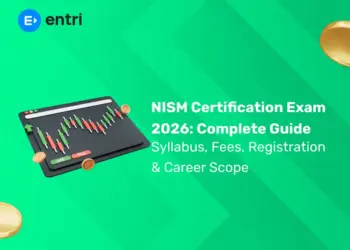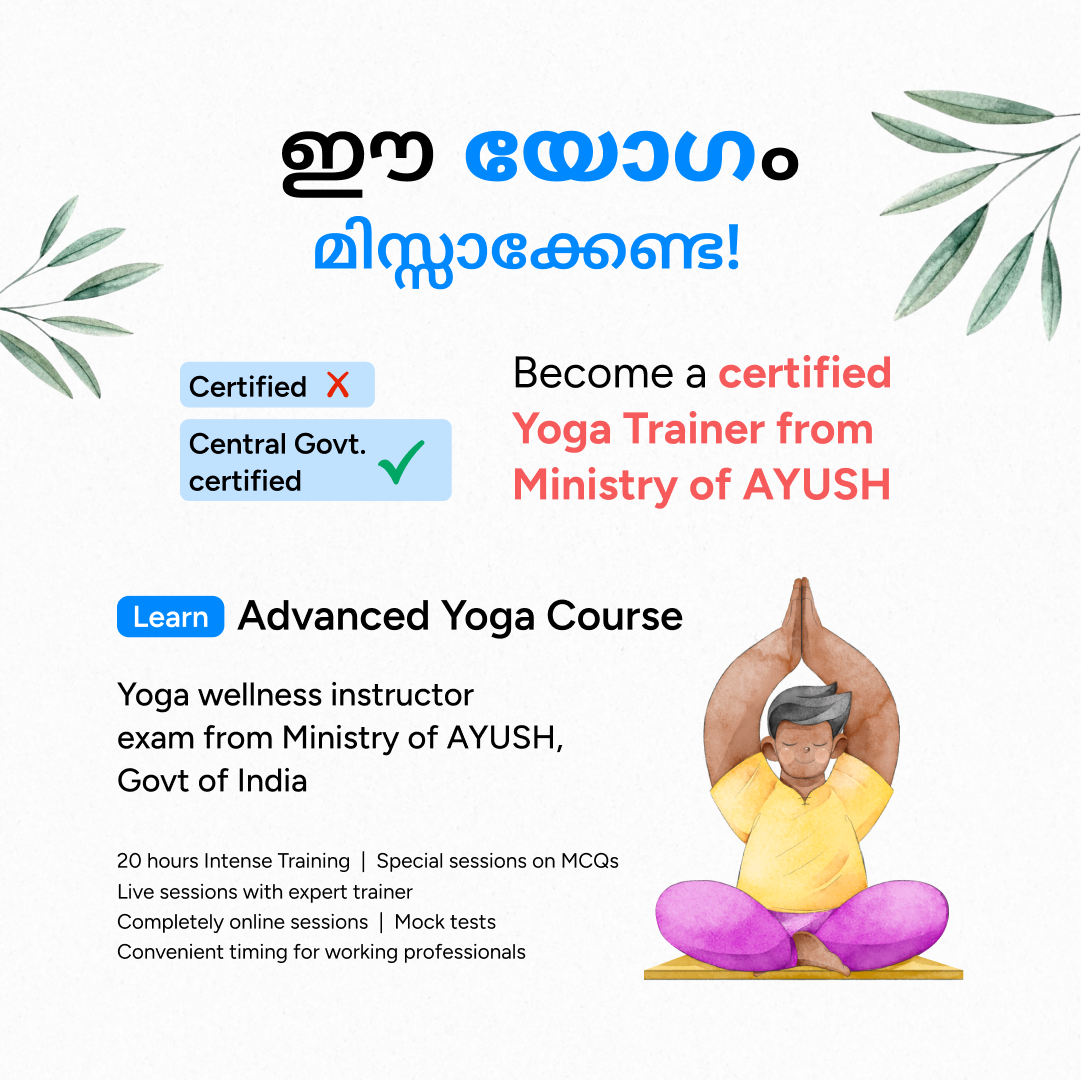Table of Contents
India’s yoga legacy is blossoming in the Gulf in terms of wellness and luxury hospitality, and multicultural living – transforming the teaching and practicing of health. For Indian yoga teachers, the GCC is a novelization of tradition meeting modernity – the possibilities of high salaries, a booming interest in yoga, and a diverse, cosmopolitan population eager for ‘real’ wellness (UAE, Qatar, Oman, Bahrain, Kuwait, Saudi Arabia).
Here is an extensive guide on how to go about obtaining a position as a yoga teacher in the Gulf. This contains certification, visa process, branding, interviewing, and how specialized programs such as Entri Yoga Course can help you develop skills and marketability. Each segment is tailored to respond to your queries, address your uncertainties, and assist you in transforming your interests into a global vocation.
Key Takeaways:
- Certification is your passport : the course covers the Yoga Alliance and AYUSH, which gives you access and legal ability to be employed.
- Real Work and Language Fluency Counts: Have a relevant, strong portfolio with real feedback and adjust your style to suit varied Gulf audiences.
- Branding & Networking is Important: Being online and reaching out can differentiate you from other applicants. Be Legitimate: Attestation, licensing and insurance are a must!
- Staying Adaptable: The dynamic nature of the Gulf wellness space is dependent on remaining relevant and allowing constantly evolving practices to become part of long-term strategy into the future.
Why Yoga Instructors Are in Demand in the Gulf
The Middle East’s commitment to health has fueled a boom in fitness centres, luxury wellness resorts, five-star hotels, and exclusive spas, almost all offer yoga today. Why? Because expats, locals, professionals, and families are looking beyond conventional gym routines for deeper relaxation, holistic healing, and mind-body balance.
-
Cultural Blend: Gulf clients appreciate Indian yoga instructors for their authenticity, depth of practice, and adaptability to multicultural audiences.
-
Wellness Spending: GCC governments and private businesses invest heavily in health and wellness initiatives, especially post-pandemic, making yoga both a trend and a necessity.
-
Career Scope: Yoga professionals often find roles as class instructors, wellness coaches, spa consultants, and even lifestyle influencers within local and international hospitality circuits.
Understand Essential Qualifications & Certifications
1: Which of these is the primary goal of yoga practice?
What Certifications Do Gulf Employers and Authorities Ask For?
Before sending out job applications, it’s essential to hold a verifiable and globally recognized yoga instructor certification.
-
Yoga Alliance (200/500-hour YTTC): The gold standard globally, recognized by most GCC employers and authorities.
-
AYUSH Ministry (India) & Yoga Certification Board: Increasingly valued, especially for government or large wellness centres.
-
CPR/First Aid: Not mandatory, but highly desirable.
-
Advanced Specializations: Styles such as Hatha, Vinyasa, Ashtanga, or therapeutic yoga often help you stand out.
The Entri Yoga Teacher Training Course aligns with international expectations, offering certification preparation for Yoga Alliance and AYUSH, rigorous practical training, and exam readiness. Their hybrid model allows flexible online and offline learning, making it accessible for aspirants across India.
Experience Matters
As nearly all job listings require at least two years’ teaching experience, ideally with mixed-level groups and international clients. Hands-on stints in Indian studios, gyms or community classes build your CV and confidence. Internships done during Entri’s course inject both skill and credibility.
Language & Soft Skills
Gulf markets prefer fluent English speakers, though any Arabic or regional dialect knowledge is a bonus. Excellent interpersonal, communication, and adaptability / cultural sensitivity are essential.)
Become a Certified Yoga Instructor
Yoga Teacher Training Course by Entri App: Master authentic yoga techniques, earn certification, and build a successful career as a professional yoga instructor.
Join Now!Step 2: Choosing a Training Course That Opens Gulf Doors
Why Does Course Selection Matter?
A Yoga TTC from a celebrated platform isn’t just a certificate; it’s your ticket to international recognition and legal compliance. Gulf countries verify your credentials and conduct attestation; any gaps can stall work visas or job offers.
Entri’s Yoga Teacher Training Course stands out by:
- Prepare for global certifications (Yoga Alliance, AYUSH).
- Live practice sessions, anatomy, philosophy, teaching methodology, special populations (children, seniors, corporate wellness).
- Document attestation, interview preparation, global networking.
- 80% placement in UAE wellness centers and luxury spas.
Step 3: Crafting a Gulf-Ready Resume and Cover Letter
What Makes an Application Stand Out?
- Start with your yoga certification, make sure the course, hours and affiliations (Yoga Alliance, AYUSH) are easy to find.
- Summarize teaching experience: styles taught, group sizes, special client stories and any awards or workshop participation.
- Add a few lines on your teaching philosophy e.g. holistic well-being, injury prevention, mindfulness for executives.
- Mention additional skills: nutrition, meditation or CPR if you have it.
- Include references or testimonials from well known studios, teachers, or students.
- Write a short and passionate cover letter, make it clear why you chose the Gulf, its culture and how your values match their market.
Step 4: Navigating Job Search & Networking in the Gulf
Where Do Yoga Instructors Apply?
-
Job Portals: Indeed Gulf, Naukrigulf, Bayt, YogaTrade, and hotel group/retreat websites (Marriott, IHG, Six Senses).
-
Direct Email: Send portfolios to wellness resort HRs or fitness managers.
-
Networking: Virtual events, Dubai Yoga Festival, wellness expos, and online forums for Indian + expat yoga teachers.
-
Entri Placement Support: Graduates from Entri’s course receive access to partner employers and the alumni network across GCC regions.
Building Your Brand
Yoga instructors who thrive globally aren’t just good teachers, they’re memorable communicators. Build a personal brand by:
-
Launching an Instagram or YouTube channel to share yoga advice, local culture integrations, and positive testimonials.
-
Designing a crisp logo, professional bio, and business cards before your big move.
-
Offering free workshops, guest sessions, or online trials to engage Gulf residents remotely before arriving.
Become a Certified Yoga Instructor
Yoga Teacher Training Course by Entri App: Master authentic yoga techniques, earn certification, and build a successful career as a professional yoga instructor.
Join Now!Step 5: Preparing for Interviews and Demo Classes
What Should You Expect?
-
Technical Questions: Yoga philosophy, anatomy, safe adjustments, teaching to beginners and advanced.
-
Demo Session: Be ready to lead a short group class (often online), showing cue clarity, safe sequencing, and personality.
-
Cultural Awareness: How do you accommodate Gulf norms for privacy, gender guidelines, and modesty in teaching?
-
Scenario-Based Q&A: Conflict resolution, modifying routines for clients with injuries, or fostering student engagement.
Prepare a digital portfolio, photos, videos, client feedback. Entri’s course includes guidance for creating demo reels and interview practice sessions.
Step 6: Licensing, Attestation & Visa Application
What Legal Procedures Matter?
-
Certificate Attestation: Your yoga certification must be attested by Indian authorities, then by the GCC country’s embassy or Ministry of Education.
-
Work Permits: Apply for either freelance or full-time instructor permits. Dubai, for example, requires registration with the Dubai Sports Council or the Health Authority; costs and timing vary.
-
Insurance: Most employers require liability insurance before final contracts (often AED 1,000/year).
-
Medical Tests: Routine health screening is mandatory.
Having Entri’s placement support team or a trusted visa consultant saves hassles with paperwork and compliance.
Step 7: Settling and Succeeding, Life as a Yoga Instructor in the Gulf
Finding your feet and making it work
Adopt multicultural pedagogy: find out about local customs, holidays, and wellness practices.
Continue professional development: AYUSH and Yoga Alliance mandate continuous education, and Entri provides advanced classes and workshops.
Get out and network: Head to local meetups, join digital communities, even fly to an international expo. Stay inspired and connected.
Look for growth: Most teachers end up opening their own studio, consulting for spa chains or head teacher training in the Gulf.
Salaries vary; boutique classes, hotel positions, and private session bundles can command AED 3,000 to AED 12,000 per month, with elite trainers cracking AED 150,000+ per annum.
Prepared to take your yoga teaching career to a global status? Joining a reliable, world-class program such as the Entri Yoga Teacher Training Course provides more than just a certificate; it’s a launchpad to a life of health, success, and impact.
Conclusion: Your Path to a Gulf Yoga Instructor Career
Getting a yoga instructor job in the Gulf is a combination of certification, practical experience, market knowledge and job applications. By completing a structured course like Entri Yoga Instructor course, gaining teaching experience and using AI tools for personal branding and job search, you can increase your chances of getting a job in top wellness centers and luxury hotels.
Ready to transform your yoga journey? Explore the Entri Advanced Yoga Instructor Course and empower yourself for holistic well-being, professional credibility, and a lifetime of growth on and off the mat.
Become a Certified Yoga Instructor
Yoga Teacher Training Course by Entri App: Master authentic yoga techniques, earn certification, and build a successful career as a professional yoga instructor.
Join Now!Frequently Asked Questions
What qualifications are required to become a yoga instructor in Gulf countries?
You need a recognised yoga certification along with practical teaching experience. Most employers also prefer candidates with strong communication skills and international exposure.
Do I need a degree in yoga to work in Gulf countries?
A degree isn’t mandatory, but a globally recognised certification is essential. Entri’s Yoga course can help you gain structured training and credibility.
Is work experience necessary for yoga instructor jobs in the Gulf?
Yes, many employers prefer at least 1–2 years of teaching experience. However, freshers with strong certification and confidence also get opportunities.
What is the average salary of yoga instructors in Gulf countries?
Salaries vary between $800 – $2500 per month, depending on the country, employer, and your experience. Private sessions and workshops can further increase your income.
Which Gulf countries have high demand for yoga instructors?
UAE, Qatar, Saudi Arabia, and Oman have growing demand due to rising health awareness and wellness tourism. Dubai is one of the top hubs.
How do I apply for yoga instructor jobs in Gulf countries?
You can apply through job portals, recruitment agencies, and direct applications to fitness centres, spas, and wellness resorts. Networking and LinkedIn also play a big role.
Do Gulf employers provide visa and accommodation for yoga instructors?
Yes, most reputed employers provide work visas, accommodation, and sometimes even transportation as part of the job package.
Can I work as a freelance yoga instructor in the Gulf?
Yes, but you need to follow local laws and may require a freelance work permit. Many yoga teachers start with full-time jobs and later move to freelancing.
What role does language play in getting a yoga instructor job in Gulf countries?
English is widely used, so fluency in English is often enough. Knowing Arabic can give you an added advantage.
How can Entri’s Yoga course help me secure a Gulf job?
Entri’s Yoga course offers professional training, structured learning, and certification that enhances your credibility. It equips you with the right knowledge, teaching methods, and confidence to apply for international yoga instructor roles.

























